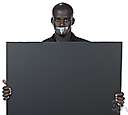censor
Also found in: Thesaurus, Medical, Legal, Acronyms, Encyclopedia, Wikipedia.
censor
prohibit or restrict the use of something: They censor motorcycles in the cemetery.
Not to be confused with:
censer – a container in which incense is burned: He lighted the censer on the altar.
censure – criticize harshly; reprove; condemn: He was censured for his use of profanity.
sensor – a device that detects and responds to a signal or stimulus: A smoke alarm is an essential sensor in case of fire.
Abused, Confused, & Misused Words by Mary Embree Copyright © 2007, 2013 by Mary Embree
cen·sor
(sĕn′sər)n.
1. A person authorized to examine books, films, or other material and to remove or suppress what is considered morally, politically, or otherwise objectionable.
2. An official, as in the armed forces, who examines personal mail and official dispatches to remove information considered secret or a risk to security.
3. One that condemns or censures.
4. One of two officials in ancient Rome responsible for taking the public census and supervising public behavior and morals.
5. Psychology The component of the unconscious that is posited by psychoanalytic theory to be responsible for preventing certain thoughts or feelings from reaching the conscious mind.
tr.v. cen·sored, cen·sor·ing, cen·sors
To examine and expurgate.
cen′sor·a·ble adj.
cen·so′ri·al (sĕn-sôr′ē-əl) adj.
American Heritage® Dictionary of the English Language, Fifth Edition. Copyright © 2016 by Houghton Mifflin Harcourt Publishing Company. Published by Houghton Mifflin Harcourt Publishing Company. All rights reserved.
censor
(ˈsɛnsə)n
1. a person authorized to examine publications, theatrical presentations, films, letters, etc, in order to suppress in whole or part those considered obscene, politically unacceptable, etc
2. any person who controls or suppresses the behaviour of others, usually on moral grounds
3. (Historical Terms) (in republican Rome) either of two senior magistrates elected to keep the list of citizens up to date, control aspects of public finance, and supervise public morals
4. (Psychoanalysis) psychoanal the postulated factor responsible for regulating the translation of ideas and desires from the unconscious to the conscious mind. See also superego
vb (tr)
5. to ban or cut portions of (a publication, film, letter, etc)
6. to act as a censor of (behaviour, etc)
[C16: from Latin, from cēnsēre to consider, assess]
ˈcensorable adj
censorial adj
Collins English Dictionary – Complete and Unabridged, 12th Edition 2014 © HarperCollins Publishers 1991, 1994, 1998, 2000, 2003, 2006, 2007, 2009, 2011, 2014
cen•sor
(ˈsɛn sər)n.
1. an official who examines literature, television programs, etc., for the purpose of suppressing or deleting parts deemed objectionable on moral, political, military, or other grounds.
2. an adverse critic; faultfinder.
3. (in the ancient Roman republic) either of two officials who kept the register or census of the citizens, awarded public contracts, and supervised manners and morals.
v.t. 4. to examine and act upon as a censor.
[1525–35; < Latin cēnsor, derivative of cēns(ēre) to give as one's opinion, recommend, assess]
cen•so′ri•al (-ˈsɔr i əl, -ˈsoʊr-) adj.
Random House Kernerman Webster's College Dictionary, © 2010 K Dictionaries Ltd. Copyright 2005, 1997, 1991 by Random House, Inc. All rights reserved.
censor
Past participle: censored
Gerund: censoring
| Imperative |
|---|
| censor |
| censor |
Collins English Verb Tables © HarperCollins Publishers 2011
ThesaurusAntonymsRelated WordsSynonymsLegend:
Switch to new thesaurus
| Noun | 1. | censor - someone who censures or condemns |
| 2. | censor - a person who is authorized to read publications or correspondence or to watch theatrical performances and suppress in whole or in part anything considered obscene or politically unacceptable functionary, official - a worker who holds or is invested with an office | |
| Verb | 1. |  censor - forbid the public distribution of ( a movie or a newspaper) censor - forbid the public distribution of ( a movie or a newspaper)medium - an intervening substance through which signals can travel as a means for communication criminalise, illegalise, illegalize, outlaw, criminalize - declare illegal; outlaw; "Marijuana is criminalized in the U.S." embargo - ban the publication of (documents), as for security or copyright reasons; "embargoed publications" |
| 2. | censor - subject to political, religious, or moral censorship; "This magazine is censored by the government" |
Based on WordNet 3.0, Farlex clipart collection. © 2003-2012 Princeton University, Farlex Inc.
censor
verb expurgate, cut, blue-pencil, bowdlerize Most TV companies tend to censor bad language in feature films.
Collins Thesaurus of the English Language – Complete and Unabridged 2nd Edition. 2002 © HarperCollins Publishers 1995, 2002
censor
verb1. To examine (material) and remove parts considered harmful or improper for publication or transmission:
The American Heritage® Roget's Thesaurus. Copyright © 2013, 2014 by Houghton Mifflin Harcourt Publishing Company. Published by Houghton Mifflin Harcourt Publishing Company. All rights reserved.
Translations
رَقيبُ الأفْلاممُراقِب مطبوعاتيُراقِب
cenzorcenzurovat
censorcensurere
arvostelijamoraalinvartijasensorisensuroidaydinminä
צינזרצנזור
cenzorcenzúráz
ritskoîaritskoîandi
cenzoriuscenzūracenzūruotilabai kritiškas
cenzētcenzors
cenzorcenzurovať
sansür memurusansür subayısansür yapmak/etmek
Collins Spanish Dictionary - Complete and Unabridged 8th Edition 2005 © William Collins Sons & Co. Ltd. 1971, 1988 © HarperCollins Publishers 1992, 1993, 1996, 1997, 2000, 2003, 2005
Collins English/French Electronic Resource. © HarperCollins Publishers 2005
Collins German Dictionary – Complete and Unabridged 7th Edition 2005. © William Collins Sons & Co. Ltd. 1980 © HarperCollins Publishers 1991, 1997, 1999, 2004, 2005, 2007
Collins Italian Dictionary 1st Edition © HarperCollins Publishers 1995
censor
(ˈsensə) noun1. an official who examines films etc and has the power to remove any of the contents which might offend people. Part of his film has been banned by the censor.
2. an official (eg in the army) who examines letters etc and removes information which the authorities do not wish to be made public for political reasons etc.
verbThis film has been censored; The soldiers' letters are censored.
cenˈsorious (-ˈsoː-) adjective very critical. She is censorious about the behaviour of young people.
ˈcensorship noun the policy of censoring. Some people disapprove of censorship.
Kernerman English Multilingual Dictionary © 2006-2013 K Dictionaries Ltd.